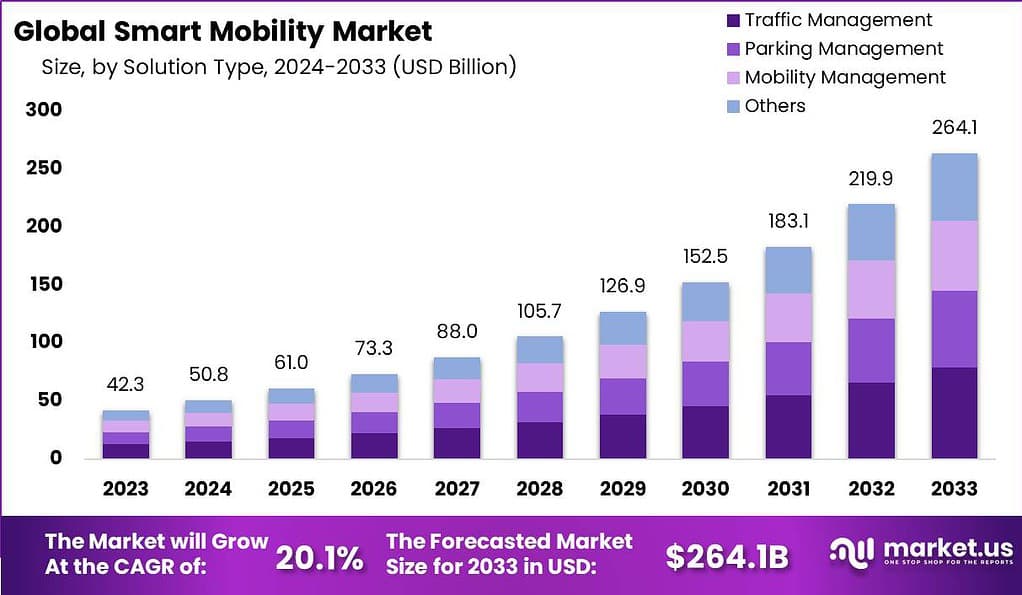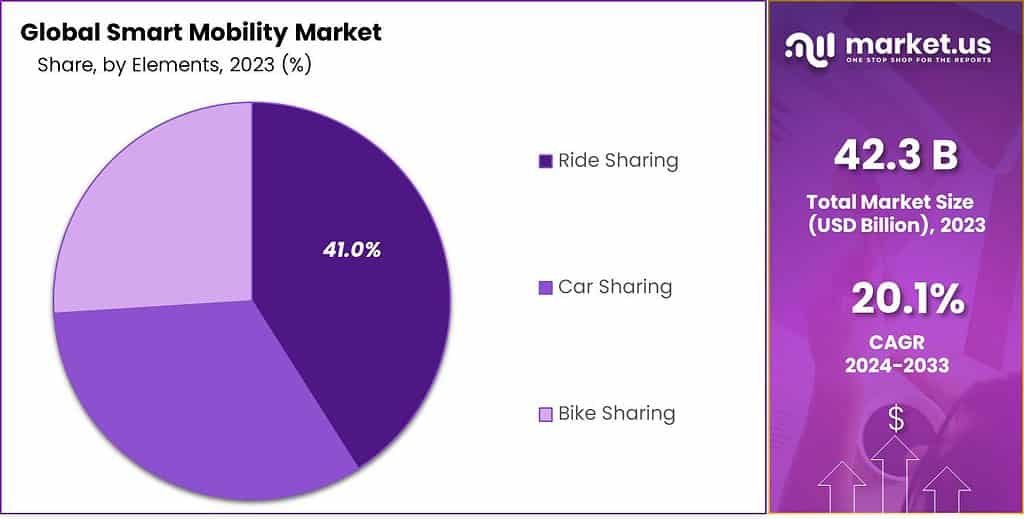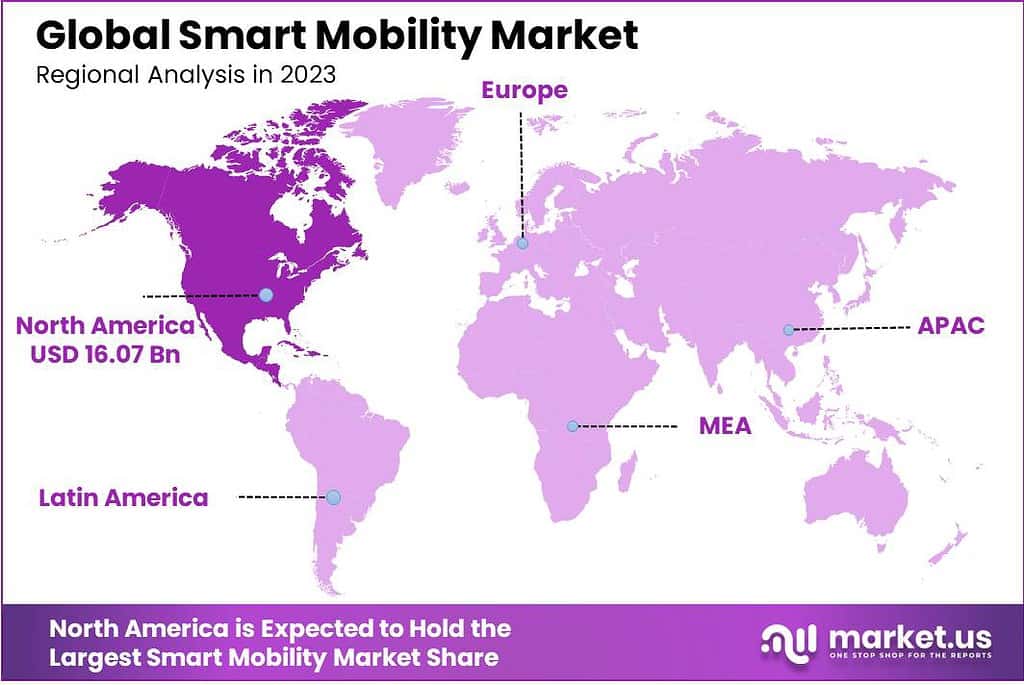New York, Jan. 30, 2024 (GLOBE NEWSWIRE) -- The Smart Mobility Market size was projected to be USD 42.3 billion in 2023. By the end of 2024, the industry is likely to reach a valuation of USD 50.8 billion. During the forecast period, the global market for smart mobility is expected to garner a 20.1% CAGR and reach a size of USD 264.1 billion by 2033.
Smart Mobility refers to the integration of advanced technologies and innovative solutions into transportation systems, aiming to enhance efficiency, safety, and sustainability. This concept encompasses a range of technologies such as autonomous vehicles, electric mobility, shared transportation services, and intelligent transportation systems. These technologies facilitate the movement of people and goods in a more connected, efficient, and eco-friendly manner.
Smart Mobility leverages data analytics, IoT (Internet of Things), and Artificial Intelligence (AI) to optimize traffic flow, reduce congestion, and minimize the environmental impact of transportation. The shift towards Smart Mobility is driven by increasing urbanization, the need for greener transportation solutions, and advancements in digital technologies. The Smart Mobility Market encompasses a broad spectrum of industries and sectors, including automotive, technology, energy, and public infrastructure. It is characterized by rapid growth and innovation, driven by the increasing demand for sustainable and efficient transportation solutions.
Download Latest Analysis Sample PDF (Including Full Table of contents, List of Tables & Figures, Chart): https://market.us/report/smart-mobility-market/request-sample/

The market includes the development and adoption of electric vehicles (EVs), autonomous vehicle technology, mobility-as-a-service (MaaS) platforms, and smart city initiatives. The integration of AI and IoT in transportation systems is also a significant component of this market. Market growth can be attributed to factors such as government policies supporting green transportation, advancements in battery technology, and the growing consumer preference for eco-friendly and convenient transportation options.
Analyst Viewpoint
From an analyst's viewpoint, several key factors are driving the growth of the Smart Mobility market. Firstly, technological advancements, particularly in AI, IoT, and battery technology, are enabling more efficient and practical Smart Mobility solutions. Secondly, there is a growing global emphasis on reducing carbon emissions and combating climate change, leading to governmental policies that favor green transportation initiatives and investments in Smart Mobility infrastructure. Thirdly, urbanization is increasing the demand for efficient urban transport systems, making Smart Mobility solutions more necessary and attractive.
Additionally, consumer behavior is shifting towards favoring convenience, connectivity, and sustainability, which aligns well with the offerings of Smart Mobility. Finally, the private sector's investment in research and development in this area is catalyzing innovation and market growth. These factors collectively contribute to a dynamic and expanding Smart Mobility market.
Buy Now this Premium Report to Grow your Business: https://market.us/purchase-report/?report_id=113326
Important Revelation:
- The Global Smart Mobility Market is expected to reach a valuation of USD 264.1 Billion by 2033, growing at a remarkable Compound Annual Growth Rate (CAGR) of 20.1% from 2024 to 2033.
- According to the United Nations, 53% of the world’s population lived in urban areas in 2018, and this figure is projected to rise to 68% by 2050. This urbanization trend is contributing to the demand for smart mobility solutions.
- In 2023, traffic management solutions dominated the market with over 30% market share, while the ride-sharing segment captured over 41% of the market share. RFID technology accounted for over 27% market share.
- In 2023, North America held a dominant market position, capturing more than a 38% share. This was driven by advanced technological infrastructure and supportive government policies.
- Major players in the smart mobility market include Cisco, Ford Motor Company, Siemens, TomTom International, and others.
Factors Affecting the Growth of the Global Smart Mobility Market
- Technological Advancements: The continuous innovation in technology, particularly in areas such as the Internet of Things (IoT), artificial intelligence (AI), and big data analytics, is a primary driver. These technologies enable more efficient, intelligent, and connected mobility solutions.
- Government Initiatives and Policies: Many governments worldwide are actively promoting smart mobility to reduce traffic congestion, lower carbon emissions, and enhance urban transportation systems. Policies and investments in infrastructure that support electric vehicles (EVs), autonomous vehicles (AVs), and connected transportation systems are accelerating market growth.
- Environmental Concerns: Growing awareness of environmental issues is leading to increased demand for sustainable transportation solutions. Smart mobility, with its focus on EVs and efficient public transport systems, plays a crucial role in reducing carbon footprints and pollution levels.
- Urbanization Trends: Rapid urbanization in many parts of the world is leading to increased traffic congestion and demand for efficient transportation systems. Smart mobility solutions are seen as a key to managing these challenges by optimizing traffic flow and public transportation.
- Consumer Preferences and Behavior: There is a shift in consumer behavior towards more flexible, on-demand transportation services, such as ride-sharing and car-sharing platforms. This shift is supporting the growth of smart mobility markets, as these services are often integrated with other smart transportation solutions.
Want to Access the Statistical Data and Graphs, Request PDF Sample @ https://market.us/report/smart-mobility-market/request-sample/
Recent Developments
- In 2023, Ford Motor Company:
- Electric Vehicle (EV) Expansion: Released new EV models like the F-150 Lightning and Mustang Mach-E GT, expanding their EV portfolio.
- Autonomous Driving Development: Continued testing and developing self-driving car technology through their BlueCruise and Argo AI partnership.
- In 2023, Siemens:
- MindSphere Open Mobility Platform: Launched an open platform integrating traffic management systems, charging infrastructure, and vehicle data to optimize traffic flow, improve public transportation, and accelerate electric vehicle adoption.
Competitive Landscape
The competitive landscape of the market has also been examined in this report. Some of the major players include:
- Cisco
- Excelfore Corporation
- Ford Motor Company
- Innoviz Technologies. Inc.
- MAAS Global Oy
- QuaLiX Information System
- Robert Bosch GmbH
- Siemens
- TomTom International
- Toyota Motor Corporation
- Other key players
Scope of the Report
| Report Attributes | Details |
| Market Value (2023) | USD 42.3 Billion |
| Forecast Revenue 2033 | USD 264.1 Billion |
| CAGR (2024 to 2033) | 20.1% |
| North America Revenue Share | 38.0% |
| Base Year | 2023 |
| Historic Period | 2018 to 2022 |
| Forecast Year | 2024 to 2033 |
Report Segmentation
Solution Type Analysis
In 2023, the Traffic Management segment held a dominant market position, capturing more than a 30% share in the Smart Mobility market. This prevalence can be attributed to the escalating demand for efficient road traffic solutions in urban areas, where congestion and environmental concerns are paramount. The integration of advanced technologies such as AI, IoT, and real-time data analytics has significantly enhanced the capabilities of traffic management systems. These systems not only optimize traffic flow but also contribute to reducing carbon emissions and improving overall urban mobility.
Key drivers for this segment's growth include increasing urbanization, rising smart city initiatives, and a growing emphasis on sustainable transportation solutions. For instance, AI-enabled traffic lights that adjust in real-time to traffic conditions have been instrumental in minimizing delays and reducing congestion. Additionally, government initiatives and investments in infrastructure development have provided a substantial boost to this market segment. The deployment of smart sensors and IoT devices for traffic monitoring and management is further supporting this growth. These technological advancements, coupled with policy support, are expected to continue driving the expansion of the Traffic Management segment in the Smart Mobility market.
Elements Analysis
In 2023, the ride-sharing segment held a dominant market position, capturing more than a 41% share of the smart mobility market. This prominence can be attributed to several key factors. Firstly, ride sharing offers a cost-effective and convenient transportation alternative for urban commuters, significantly reducing the need for personal vehicle ownership. This aspect is particularly appealing in densely populated cities where traffic congestion and parking challenges are prevalent. Secondly, the increasing penetration of smartphone technology and internet connectivity has facilitated the rapid growth of ride-sharing platforms, making them more accessible to a broader consumer base.
Furthermore, the environmental benefits associated with ride sharing, such as reduced carbon emissions and lower traffic volumes, align with the growing global emphasis on sustainable living. This environmental consideration has not only attracted environmentally conscious consumers but also garnered support from governmental policies promoting green transportation solutions.

Technology Analysis
In 2023, the RFID (Radio Frequency Identification) segment held a dominant market position within the smart mobility market, capturing more than a 27% share. This significant market share can be primarily attributed to the versatile applications of RFID technology in enhancing transportation and mobility services. RFID's key advantage lies in its ability to enable efficient tracking and management of resources, a critical aspect in the complex ecosystem of smart mobility.
One of the primary drivers for RFID’s dominance is its extensive use in public transportation systems for fare collection and access control. Cities worldwide have implemented RFID-based card systems for buses, trains, and subways, streamlining the ticketing process and improving the overall commuter experience. This efficiency has led to increased adoption rates among transit authorities, contributing to the technology's market growth.
Key Market Segments
By Solution type
- Traffic Management
- Parking Management
- Mobility Management
- Others
By Elements
- Bike Commuting
- Car Sharing
- Ride sharing
By Technology
- 3G & 4G
- Wi-Fi
- GPS
- RFID
- Embedded Systems
- Others
Regional Analysis
In 2023, North America held a dominant market position in the smart mobility sector, capturing more than a 38% share. This leading stance can be attributed to several factors that are distinct to this region. The United States and Canada, being technologically advanced nations, have been early adopters of smart mobility solutions, driven by a high level of urbanization and a tech-savvy population.
The region's strong economic background has facilitated significant investments in smart mobility infrastructure, such as smart traffic management systems and advanced public transportation networks. Moreover, the presence of major technology companies and startups in North America has fostered innovation and development in the smart mobility space. These entities are continually experimenting with and implementing new technologies like autonomous vehicles, IoT-enabled transportation, and smart city initiatives, propelling the market forward.
Another contributing factor to North America's market dominance is the governmental support for smart mobility projects. Policies and initiatives aimed at reducing carbon emissions and improving urban mobility have led to the adoption of electric and hybrid vehicles, further boosting the smart mobility market.

By Geography
- North America
- The US
- Canada
- Europe
- Germany
- France
- The UK
- Spain
- Italy
- Russia
- Netherland
- Rest of Europe
- APAC
- China
- Japan
- South Korea
- India
- Australia
- New Zealand
- Singapore
- Thailand
- Vietnam
- Rest of APAC
- Latin America
- Brazil
- Mexico
- Rest of Latin America
- Middle East & Africa
- South Africa
- Saudi Arabia
- UAE
- Rest of MEA
Check out more related studies published by Market.us:
- Generative AI in Gaming Market is predicted to reach a valuation of USD 7,105 Mn by 2032, registering highest CAGR of 23.3%.
- Generative AI in Marketing Market is valued at USD 1.9 bn in 2022. With a CAGR of 28.6%, the market is set to reach US$ 22.1 bn by 2032
- Intelligent Language Translator Market was valued at USD 1,208 Mn in 2023 and is expected to reach USD 2,737 Mn by 2032, At a CAGR of 9.8%.
- Immersive Media Market was valued at USD 30.7 Billion in 2023 and is expected to reach USD 178.7 Billion by 2032, at a CAGR of 22.3%.
- DevOps Market accounted for USD 11.2 Bn in 2023 and is expected to grow to around USD 57.3 Bn in 2032, highest CAGR of 20.5%.
- Smart Payments Market Growth Projected to Lead to USD 462.2 Billion by 2032, Asia-Pacific held the largest market share of 37.0 % in 2022.
- Home Office Spending Market size is projected to surpass at USD 111 Bn by 2032 and it is growing at a CAGR of 16% from 2022 and 2032.
- Language Translation Device Market Projected To Reach a Revised Size Of USD 3,166.2 Million By 2032, Growing At A CAGR of 6.6%
- Real-Time Kinematic Machine Market was valued at USD 2.9 Bn and is projected to reach USD 4.8 Bn by 2032, with a CAGR of 5.3%.
- Datafication Market accounted for USD 285 Bn and is expected to grow to around USD 883 Bn in 2032. to register the highest CAGR of 12.3%.
- Low-latency Content Sharing Market Expected to Surpass USD 80.1 Billion by 2032, at a CAGR of 20.6% by 2032.
- K-12 Education Technology Spend Market size is expected to be worth around USD 132.4 Bn by 2032, growing at a CAGR of 25.2%
- Restaurant Digitalization Market is likely to hold a valuation of USD 29.6 billion in 2032. As the average global market rises by 16.3% CAGR.
- 2D Barcode Reader Market size is expected to be worth around USD 16.6 Bn by 2033, growing at a CAGR of 7% during forecast period.
- Vendor risk management market is anticipated to be USD 42.6 bn by 2032. It is estimated to record a steady CAGR of 15.7%.
About Us
Market.US (Powered by Prudour Pvt Ltd) specializes in in-depth market research and analysis and has been proving its mettle as a consulting and customized market research company, apart from being a much sought-after syndicated market research report-providing firm. Market.US provides customization to suit any specific or unique requirement and tailor-makes reports as per request. We go beyond boundaries to take analytics, analysis, study, and outlook to newer heights and broader horizons.
Follow Us On LinkedIn Facebook Twitter
Our Blog:
